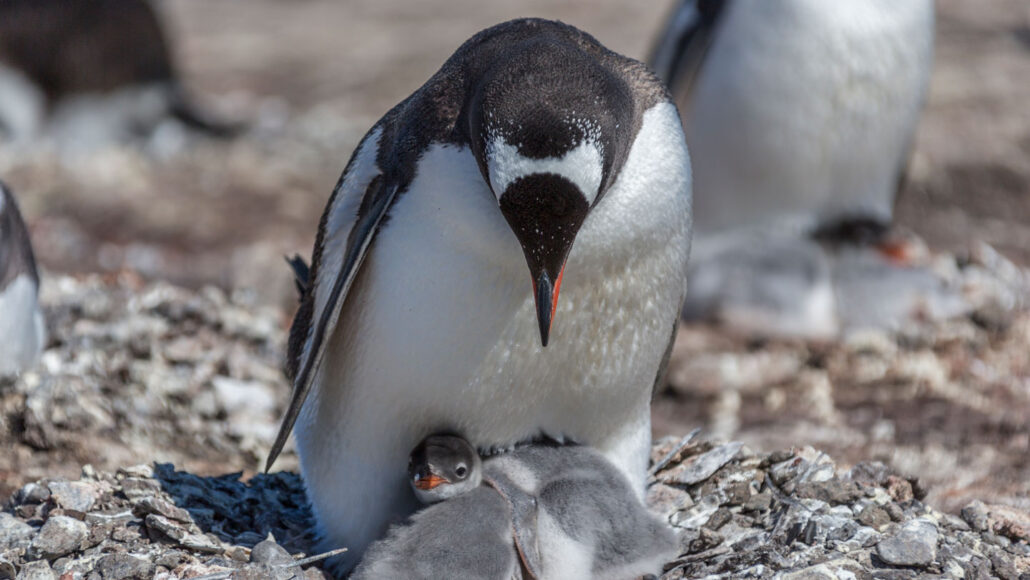Let’s learn about animals’ bizarre sleep schedules
Reindeer snooze while chewing, penguins take thousands of naps per day, frigate birds sleep while flying

Nesting chinstrap penguins (Pygoscelis antarcticus) get a few seconds of shut-eye at a time while watching over their chicks.
Izzet Keribar/Stone/Getty Images
Share this:
- Share via email (Opens in new window) Email
- Click to share on Facebook (Opens in new window) Facebook
- Click to share on X (Opens in new window) X
- Click to share on Pinterest (Opens in new window) Pinterest
- Click to share on Reddit (Opens in new window) Reddit
- Share to Google Classroom (Opens in new window) Google Classroom
- Click to print (Opens in new window) Print
Many of us don’t get as much sleep as we should. We might stay up late talking to friends or scrolling through our phones. We pull all-nighters to finish important projects. And sometimes we have to wake up too early for school or work. But in a perfect world, humans would lay down for an average eight hours of shut-eye per night.
Not so for other animals.
Some creatures have adapted to get by on much shorter bouts of sleep. Northern elephant seals, for instance, sleep an average two hours per day for less than 20 minutes at a time while at sea. They dive deep below predators to avoid getting eaten in their sleep. Nesting chinstrap penguins take sleeping to another extreme. They nap thousands of times each day for mere seconds at a time. This allows them to stay alert around the clock to protect their chicks from predatory birds or other penguins.
Other animals have evolved to multitask in their sleep. Ocean-crossing frigate birds can sleep while they fly above the waves for months at a time. Reindeer, meanwhile, can sleep while eating so they get enough food during the Arctic’s brief summer months.
Still, human sleep patterns are pretty extreme compared with those of our closest relatives. Other primates snooze nine to 15 hours each day. Humans may have evolved to get by on less sleep because living on the ground — rather than in trees — requires more time awake to watch for predators. Plus, a big part of human survival is learning new skills and making social connections. All that learning and socializing cuts into sleep time.
Want to know more? We’ve got some stories to get you started:
Reindeer can chew food in their sleep Multitasking may help these animals get shut-eye under tough conditions (2/19/2024) Readability: 7.4
Northern elephant seals snooze only two hours a day at sea The marine mammals sleep less than 20 minutes at a time during dives (7/18/2023) Readability: 6.5
These penguins nap 10,000 times a day, for seconds at a time Such oodles of snoozes add up, providing more than 11 hours of actual shut-eye (1/9/2024) Readability: 7.1
Explore more
Wild elephants sleep for only two hours at night
Frigate birds spend months without landing
Compared to other primates, humans get little sleep
Sleeping glass frogs go into stealth mode by hiding red blood cells
Surprise! Some jellyfish appear to need their zzz’s
Why cats nap and whales snooze
Activities
Our human sleep schedules are guided by 24-hour cycles called circadian rhythms. These natural rhythms don’t just guide when we fall asleep and rise. They also affect our hormone levels, alertness, heart rate and more. Is it possible to tell where in your circadian rhythm you are just by measuring factors like body temperature? Find out in this Science Buddies experiment.







